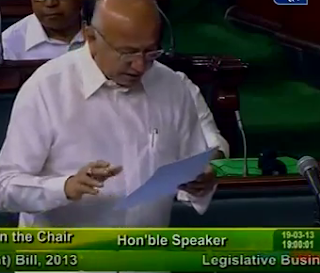Anti-Rape Bill Passed: Parliament Comes To the Rescue of Men
A bill that was set out to empower women and make stringent laws for punishing crimes against them became all about men in the parliamentary debate on Tuesday.
The Anti-rape bill was passed by the Lok Sabha amid a series of debates that started even before it was tabled in the Parliament.
The major provisions of the bill that have gathered media attention include the following:
1. The government has made the crime of rape as gender-specific instead of gender-neutral amid protests from several women’s organizations.
2. The age of consent has been set at 18 years as noted in the Ordinance.
3. Stalking, eve-teasing and voyeurism to be seen as bailable offences if committed by a person for the first time.
4. Marital rape not included.
First, the government tweaks the landmark recommendations of the Justice Verma committee and makes an Ordinance that is widely criticized by the women’s rights groups. And now, some provisions in the anti-rape bill and the manner of debate seen in the Lower House on Tuesday send out a certain signal to women citizens of the country. It sends out a message that women’s rights can be fairly bargained.
The debate in the Parliament was full-fledged patriarchy at play. Sharad Yadav, chief of Janata Dal (United), perhaps, thought that it was wise to crack a joke and lighten the moment with his rhetorical and assumingly funny question of “Who amongst us have not followed girls?” Perhaps for him, an issue as serious as stalking leaves a room for levity. Perhaps, he never heard of the case of Priyadarshini Mattoo who was stalked continuously, raped and eventually murdered.
The earlier version of the bill had provided for eve-teasing, voyeurism and stalking as non-bailable offences. In the all-party meeting before the bill was tabled in the Parliament, the government watered down the punishment, making offences of first-time eve-teasers, voyeurs and stalkers bailable.
Voyeurism was a widely debated and a confusing subject for our parliamentarians. Though it is retained as a sexual offence, but it was debated to be dropped on grounds of being abused. The bill clearly states the definition of voyeurism. Yet the parliamentarians find it misleading.
Several other parliamentarians, while attacking the “western culture”, continued with statements of a glorifying past, of Ramayan and Mahabharata, bringing in the distress of Draupadi, and the purity of Sita wherever they fitted well. Most of them painted a picture of a ‘perfect’ India. Unfortunately, in their perfect India, women are considered victims only when they are ‘pure’ and stay within their boundaries. Speaking of Indian culture, it would be interesting to question what exactly were the intentions of Lord Krishna when he watched Gopis bathing themselves, or when he stole their clothes while they bathed. But probably it’s just one of the Lord’s "leelas" that are to be treasured.
Another issue that was widely debated was the age of consent. Under the Indian Penal Code, the age of consent had been 16 years of age until 2012. The Ordinance, out of nowhere, raised the age of consent to 18, and brought about an unnecessary commotion, drifting everybody’s attention from the serious issue of crimes against women. Those in agreement of the increased age of consent state that 18 is the age when women are allowed to be married. They fear an age of consent at 16 would lead to child abuse by adults and child marriages. They argue that the amendment would protect children from sex trafficking.
We all know women can marry at the age of 18. But age of consent is not about marriage, it is about sexual autonomy. And it is about time people recognize sex as different from marriage. What was needed was a good law, not moral policing by the government. But because of the amendment, now a consensual sex between a 17-year-old boy and a 17-year-old girl will be considered rape. So even if the girl says it was consensual, she would be considered as a rape victim, and the boy would be sent off to a juvenile reform centre. Setting the age of consent at 16, in no way, would have led to girls being married off as child-brides since the age of marriage set at 18 has not been touched. But the age of consent at 18 assists the police and parents to abuse the law against young couples, especially in cases of inter-caste relationships.
Sumitra Mahajan from BJP had clearly stated her stand against marital rape to be considered as crime, requesting the government that the state should let families take care of their own issues. Pressing marital rape as a criminal offense would have been the most effective method of stating that rape is about forced sex, an assault on an individual’s body and mind, whether inside or outside a marriage. But the bill smartly avoided going over that terrain as if to appease the men in this country.
The anti-rape bill that was built on the Ordinance promulgated in the aftermath of a brutal gang-rape in Delhi in December last year has turned into, as apparent from the debates in the Parliament, a crusade against feminism, to make sure innocent men aren’t trapped. But what they don’t see is that the bill makes sure that even criminals get bailed out.
Our parliamentarians fear innocent men being framed on charges of stalking, eve-teasing and voyeurism, but they don’t have a problem with calling 17-year-olds who exercise their sexual autonomy as criminals. Many legislators cite the example of the anti-dowry law that had been misused on several occasions. What they don’t see is that for every one woman who would misuse the law, there are a million more in desperate need for it.
The anti-rape bill is being widely projected as anti-men. But clearly, the majority of our Parliamentarians never had the interests of women in mind.
Disclaimer: The views expressed here are the author's personal views, and do not necessarily represent the views of Newsclick
Get the latest reports & analysis with people's perspective on Protests, movements & deep analytical videos, discussions of the current affairs in your Telegram app. Subscribe to NewsClick's Telegram channel & get Real-Time updates on stories, as they get published on our website.

























